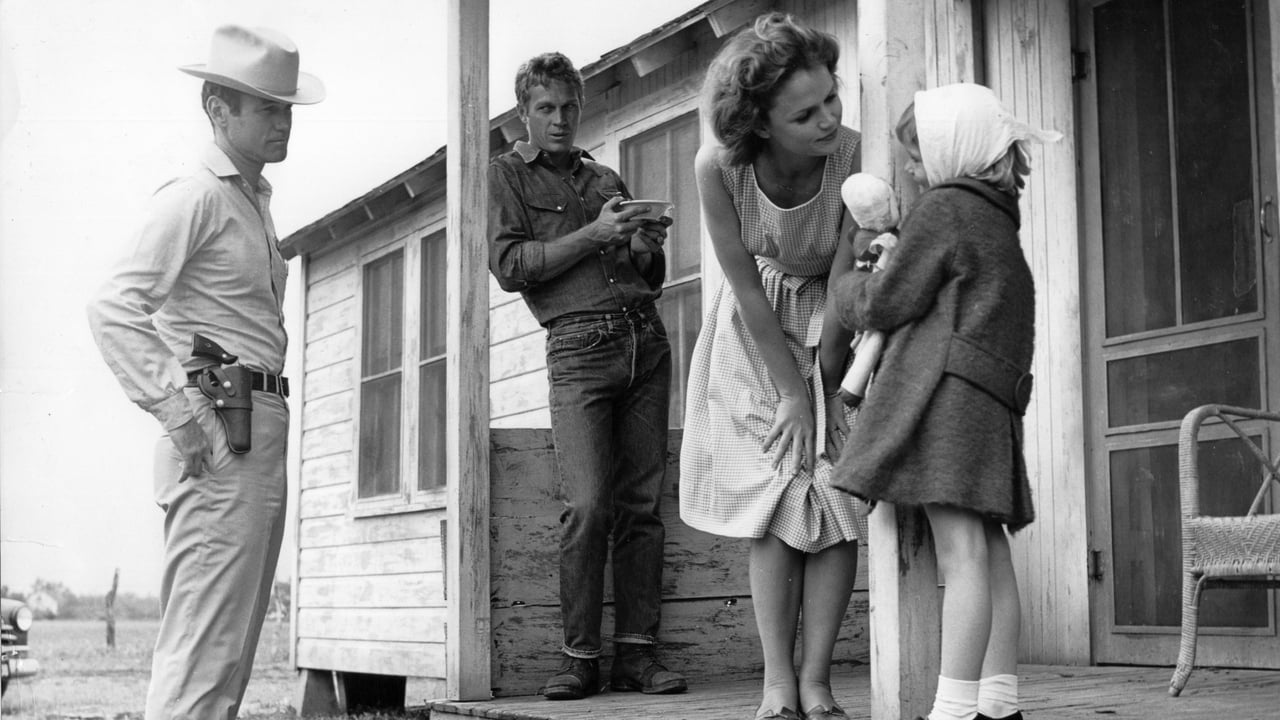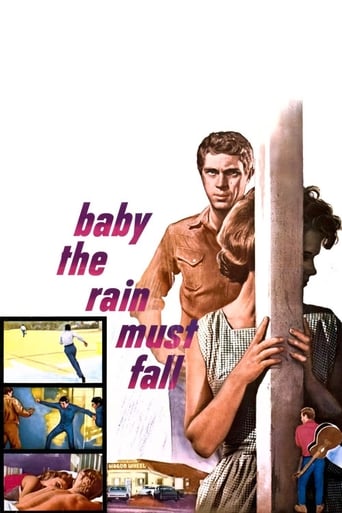

Steve McQueen draws on the experience of his own unhappy youth in his portrayal of Henry Thomas, a would be singer who's recently paroled, as he tries to make it as the front man of a local string band in Columbus, Texas. His dysfunction as a husband, father and indeed, as a human being is poignantly demonstrated in his first appearance on screen with wife Georgette (Lee Remick), he merely shakes her hand. If you didn't know this was going to be a sad and depressing film, this would have been the first hint.As the viewer, one painfully relates to Lee Remick's character, desperately looking for a way to reconnect with her husband, but finally realizing that she must come to terms with her disillusionment and head for something better for herself and her young daughter (Kimberly Block). One's appreciation of the movie will have to come from the performances of the principal players and not the story itself as it's not a film that will leave you hopeful.What adds to the already somber tone of the movie was a pall that was cast during filming with the announcement of John F. Kennedy's assassination. For McQueen, who had met Kennedy earlier in his career, the event was as traumatic as for the rest of the cast and crew. Filming was interrupted for a number of days before shooting could resume, and it wouldn't be out of the question that the President's death had a subliminal impact on the tone of the story.
... View MoreSlowly paced, bleakly photographed, virtually plot-less, the 100-minutes is not everyone's cup of tea. There are compensations, however. That lonely clapboard house forlorn on the dreary prairie is a perfect metaphor for Henry (McQueen) and Georgette's relationship. He's all pent-up rage at his brutal upbringing, while she's clinging to hope and their little girl (Block). Together, their silences speak louder than words, the distance just too great. All this plays out in elliptical fashion that requires some patience, and I'm not surprised the movie was a flop, given what McQueen fans likely expected. There are moments of frantic action, as when Henry attacks his guardian's grave for the wrongs done him, especially now that she's left him nothing from her meagre assets. But the prevailing pace is contemplative, to say the least.I'm not sure McQueen was the best choice for the tormented Henry. The actor, of course, excelled in action pictures, nuance not exactly being his forte. Yet Henry's real tragedy calls for a sensitive range that's largely missing from his scenes with Georgette. We get the distance, but not the struggle, and without the inner struggle the tragedy is diminished. Certainly, no one can be accused of overplaying, especially Don Murray whose sheriff comes across as something of a well-meaning cypher. Somehow the movie reminds me of an episode typical of the old TV series Route 66 (1960-64). The bleak location photography, the downbeat dramatics, the forlorn characters, all typify that ground-breaking series. I wonder if there was some cross-over given the time period.Anyway, action fans should skip this McQueen feature. For others, patience with the slow- developing human interest should provide compensation.( In passing-- thanks to the reviewer who confirmed my glimpse—Henry does plant the hopeful cherry tree with the roots still in a tin can bottom. Is that act of sabotage intentional or just his usual carelessness.)
... View MoreIt seems that every, single time I see Steve McQueen in any movie (be it from the beginning, the middle, or the end of his career), I always end up asking myself - "How the hell did this dull, non-charismatic bloke ever become a big-name star?" I find McQueen to be one of the blandest, insincere and unconvincing actors of his (or any) generation. Far from being what I would consider a "cool" dude, McQueen really had a tendency to grate on my nerves with his blah character portrayals.And if having to endure McQueen's dreary screen-dynamics was bad enough, I think that when it came to the depressing and absurd nature of this film's story, the viewer would have to be pretty dense and mighty gullible to take its utter nonsense at face value.From my point of view, this film's only really worthwhile moments were the unintentionally hilarious scenes where McQueen (who was unconvincingly playing an ex-con with a mean, hair-trigger temper who's now trying to make it as a rockabilly singer) lip-syncs during his live performance on stage at the town's local hot-spot.Man, you wouldn't believe how really bad McQueen was at lip-syncing. Not only could he not get his mouth in sync with the words, but the voice of the real singer did not suit McQueen at all.Ha! What a laugh-and-a-half! McQueen was so pathetically bad that I couldn't help but burst out laughing.Set in the town of Columbus, Texas - This clichéd "rebel-without-a-cause" story really sucked. I thought that its title "Baby, The Rain Must Fall" was very unfitting, since all of the troubles (rain) that fell on McQueen's character were clearly brought on by his own stupid actions.P.S. - Had this film not starred McQueen, then, yes, I might have actually rated it somewhat higher.
... View MoreHorton Foote wrote some decent stage plays, some fine television dramas and was equally adept at dramatising works from other mediums for the big screen. It is indisputable that the highlight of his career was his screenplay for Harper Lee's To Kill A Mockingbird so that anything post-Mockingbird was somewhat anti-climactic. In the event for his follow-up screenplay he chose to adapt an earlier play/teleplay of his own, The Travelling Lady and to team up again with director Robert Mulligan who had, of course, directed Mockingbird. I haven't seen The Travelling Lady in either of its earlier formats but given a title like that it's reasonable to assume its focus was on the eponymous character who is played here by Lee Remick. For reasons best known to himself and Mulligan Foote has now given the lion's share of the story to Henry Thomas (Steve McQueen) rather than his wife, Georgia (Remick), presumably because McQueen had more box office clout than Remick. Foote specialized in wistful, rural dramas (The Trip To Bountiful for example) and this is yet one more fish from the same bouillabaisse, neither better nor worse than any other. Although she had a wide range (amoral perjerer, Anatomy of a Murder; nymphomaniac, The Detective) Remick excelled in clean-cut fiances, wives and mothers and to all intents and purposes she walks away with the film under McQueen's nose. This is a quiet, gentle film full of acute observations of rural life and the mores of small town America and is ripe for rediscovery.
... View More